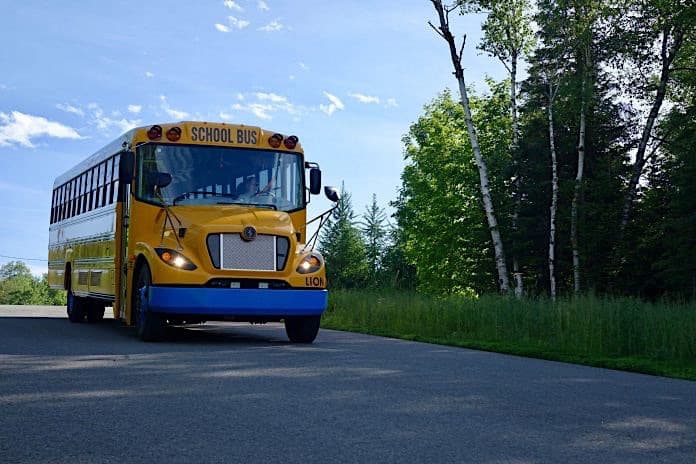A little over a year ago, 17-year-old Charles Druker read an article that got him thinking about the dangers of diesel exhaust and the impact on children. He began researching how electric school buses can be affordably implemented into operation.
“It was about climate change, global warming, most specifically on diesel exhaust and particulate matter on kids’ health,” said the teen of the New York Times article that first grabbed his attention.

One article began Druker’s journey from advocate to running his consulting company to teach others about electric school bus benefits.
He explained that as he continued to research the topic, he found that diesel exhaust is one of the worst chemicals in the air, and its exposure to children is extremely high on and around school buses. He noted diesel exhaust is linked to harming physical health as well as academic achievements.
“It was kind of shocking to me that this is so dangerous … and it’s exposed to so many kids all the time,” he explained. “And you have kids sitting on buses for 30 to 40 minutes every single day, just breathing in these really, really harmful toxins.”
Druker has since opened his own consulting company to teach others about electric school bus benefits.
He also cited a Miami Herald article in January that shared the influence of a Miami-Dade County Public Schools middle school science fair project. Student Holly Thorpe concluded that carbon dioxide fumes inside buses were 10 times higher than the limits recommended by the U.S. Environmental Protection Agency. She shared her findings with the school board and urged the members to switch to zero-emission buses. The school district is now transitioning to an all-electric fleet.
“It got me thinking like, wow, there’s a big problem with how people are transporting themselves because they’re exposing themselves and their kids and so much of our community population to this really, really harmful toxin,” Druker added.
He explained that while he doesn’t ride a school bus to school and home every day, his school does operate buses that shuttle students between all three of its campuses. He noted that he rides one of those buses as needed. After continuing with his research, he approached his own school’s administration team at Buckingham Browne & Nichols School in Cambridge, Massachusetts, and discussed his findings.
“I said I think we should probably look into electric vehicles because it’ll be a great opportunity,” he recalled.
The administration asked for more research. Druker said over the course of the following two or three months, he called grant agencies, environmental researchers and environmental protection agencies. He also spoke with electric bus manufacturers and vehicle-to-grid regulators and other people in transportation that knew about electric vehicles.
“I gathered really solid information and presented it to my school. And they really liked it,” he said, adding that his district is now starting to transition the small activity vans and shuttle buses to electric the next school year. “They loved what I gave them, they loved my idea.”
Druker then shared his research with other schools and transportation directors nationwide. That was about nine months ago when his Green Yellow Bus Initiative was born.
“I started emailing other schools and now here I am running a full-time consultancy,” he recalled. “It kind of spiraled out of control a little, and now I’m working with more than just my school. … I found that there’s such a huge market failure in the whole field of electric vehicles because people don’t think it’s the right choice. Everyone likes the idea of electric vehicles, but in the back of their head, they think oh, it’s not practical, it’s too expensive, or it doesn’t have the right range.”
But he added there remains one factor that stands above the rest as to why to invest in electric buses, and that is because they are a better alternative than diesel engine buses.
“It’s removing the harmful toxins from our environment. And I think that the biggest reason people aren’t implementing electric vehicles is just because of a lack of knowledge and I wanted to correct [it]. I’m not trying to sell anyone anything, I’m a place to get information because I truly believe once people have the information on electric vehicles, they’ll be willing to pursue.”
How The Green Yellow Bus Initiative Works
Now a senior in high school, Druker sends as many emails as he can throughout the week to superintendents, CFOs and transportation directors, telling them about his service and linking them to his website. The first batch of emails he sent resulted in about a 90 percent response rate.
He said after reviewing a profile of the school he’s talking to, he advises them that electric school buses are affordable through grants and vehicle-to-grid technology. From there, he sets up calls with those interested and then connects them with a sales representative for follow-up.
“But I’m really more informational,” he said. “I give them information, mostly about the economic breakdown of how electric buses are possible.”
When asked why he does all of it for free, he shared that he thinks charging people would disincentivize the topic and discourage people from speaking with him. “I really care about going electric,” he said. “I want to reiterate I’m not trying to sell anyone anything. I’m just trying to give more information because I really think that the only thing preventing implementation is this lack of information. It never even crossed my mind to charge schools for this type of service because all I’m doing is telling them information that I’ve consolidated into an easy place. I don’t need money and I want them to actually do it, and I feel like charging will disincentivize without helping my cause.”
He shared he has yet to see the full deployment of an electric school bus at one of the districts he’s spoken with, since he hasn’t been consulting for more than a year, and the entire electric bus implementation process takes anywhere from 12 to 18 months. However, he noted that he’s working with school districts across the nation from California to Florida, Illinois, and Massachusetts.
Related: New York City Council Passes Bill for All-Electric School Buses by 2035
Related: Historic Infrastructure Bill Starts Flow of Electric School Bus Funding
Related: ACT EXPO Panelists Discuss Electric Bus Adoption, Infrastructure Needs
Related: Selecting the Fuel that Makes Cents for You: Electric
Related: Transportation Network Companies Invest In Electric (School Bus) Future
“But even if I don’t get a single bus out, I’m at least spreading the message and getting people to look into this, which I think is a great thing,” he said.
However, he said his consulting has taken a back seat to a more pressing matter – completing his college applications for next year. But he hopes to eventually grow his consulting business to include students in other states, he noted.
“I think if I were to try to expand The Green Yellow Bus Initiative, I’d make different chapters in different areas and actually have students of their own schools be trained in how to give this presentation,” he said. “… It’s kind of weird to be interacting with businessmen as a high schooler, but once they kind of know how these types of deals usually go, then I think I can really get a lot of traction with other people doing a similar thing as me. But they definitely need training and I definitely think there’s value to having them being kids in the community.”
Once in college, Druker said he wants to study environmental studies and public policy programs to continue to make a difference.
“The biggest thing that’s really animated me through this is the fact that no one knew about this. I couldn’t believe that I was a high school Junior and was the one that had to tell everyone. If there were just some government programs or if there was more public information out that you could get cheap electric buses and that diesel exhaust is bad for kids, I feel like this would have happened a few years ago,” he explained. “But there hasn’t been enough policy surrounding how crucial this is. And I really think it’s one of the most important things we can be doing.”














